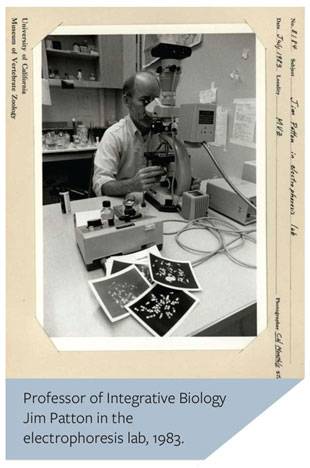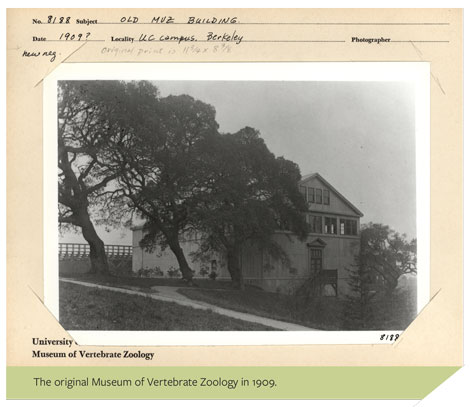

The University of California is celebrating its sesquicentennial this year and, although the Department of Integrative Biology (IB) wasn’t created until 1989, it has evolved from departments like zoology, botany, physiology, anatomy, paleontology, and genetics —many of which originated in the 19th century. The
year before IB was founded, for instance, the Department of Zoology celebrated its 100th anniversary. Brothers Joseph and John Le Conte were founding faculty members of scientific study at Berkeley, teaching all of the biological and physical sciences and hanging out with the likes of John Muir.
Those previous departments were consolidated into a larger framework to emphasize leadership in the advancement of the biological sciences and to address new and larger questions in 21st century biology, says Marvalee Wake, the founding chair of IB and currently a professor of the Graduate
School. “Integrative biology provides both a philosophy and a mechanism for the collective expertise from diverse but relevant scientific fields,” she says. “It seeks both diversity and inclusiveness. And it deals with questions across all levels of biological organization.” Current leaders in the science are finding wide-ranging applications for both humans and the biodiversity of the planet.
It’s impossible to name all the countless discoveries and achievements that have been made during IB’s short history or the longer history of its predecessors. However, here’s a partial list:
- Understanding early human evolution
- Conducting the first experimental work on physiological ecology of plants
- Developing bio-inspired materials and robots
- Assessing and understanding the Tree of Life – the relationships of living and extinct species with each other and the environment
- Understanding how new species arise, and how some go extinct
- Providing new insights into the neurobiology, ecology, and the evolution of behavior
- Assessing the biotic and physical interactions, past and present, that are involved in climate change and its known and potential effects
- Developing new ways of integrating the accumulating knowledge of the genetics, physiology, development, structure, ecology, and evolution of life’s processes in diverse species, especially the implications for human biology
In the course of their work, IB faculty have earned all the most prestigious awards and prizes in their general areas of research and have held presidencies of the major national and international professional societies. Several have received honorary degrees from other institutions. Seven members of the department belong to the National Academy of Sciences —which is more than those held by 21 states in the U.S. Eight are members of the American Academy of Arts and Sciences, three of the American Philosophical Society, one is a MacArthur Fellow, and several are medalists or fellows of various academies and societies.
prestigious awards and prizes in their general areas of research and have held presidencies of the major national and international professional societies. Several have received honorary degrees from other institutions. Seven members of the department belong to the National Academy of Sciences —which is more than those held by 21 states in the U.S. Eight are members of the American Academy of Arts and Sciences, three of the American Philosophical Society, one is a MacArthur Fellow, and several are medalists or fellows of various academies and societies.
Imagine what advances are possible in the next 150 years! You can help to fund future discoveries in the Department of Integrative Biology. Just contact Kirsten Swan, Senior Director of Development at 510-643-2228 or kswan@berkeley.edu or donate online at: give.berkeley.edu/ib.
Back to Main Spring 2018 Newsletter Page





